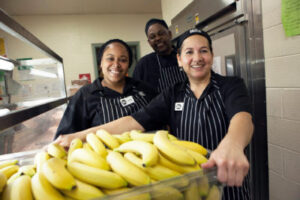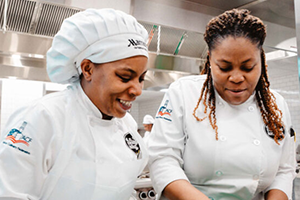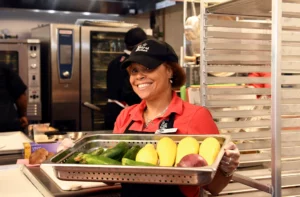There’s a long-standing perception that women dominate the nonprofit sector. In fact, on average, women make up well over 70 percent of the sector’s workforce, according to a study done by American Association of University Women, but the statistics of women in nonprofit leadership roles, especially at the executive and Board level, show that considerable gains have yet to be made. According to recent findings by the Urban Institute, nationally only 46 percent of board chairs are female with even more ground to made up at the executive level.
DC Central Kitchen’s mission demands that we use food to strengthen bodies and build communities, but also to empower minds. We believe that everyone deserves a seat at the table, and if there isn’t a seat, we will not only recognize that gap, but we will fill it. A big part of recognizing who is missing from the table is making diversity, equity and inclusion an integral part of our organization’s leadership model. “When you celebrate or prioritize diversity, we benefit from it and if we’re missing a perspective, we’re at a loss,” shares our Chief Human Capital Officer, Dr. Tee Okasi-Nwozo. “To the extent that we can embrace and include different perspectives, it makes our programming a lot more robust, it makes our practices better, it makes our processes better.”
Prioritizing this representation matters. Sixty-seven percent of the leadership of DC Central Kitchen, including managers, directors, and executives are women. Women make up nearly two-thirds of our C-suite—including our beloved Dr. Tee, who was recognized by the Washington Business Journal last year as one of the region’s top innovators in the human resources field.
When women of all ages enroll in our Culinary Job Training program or apply for a job at the Kitchen, they can see a path forward for themselves. Sami Reilly, Director of Contract Meals and Nutrition, believes that is because they are “able to see someone in a position showing them that holding certain roles is possible.”
There are certain traits women bring to the table, like emotional intelligence and creative reasoning. DCCK Chief Financial Officer Glenda Cognevich believes “the work involves a level of empathy and a drive that’s about more than just money.”
“Women bring an understanding about how the world can treat you badly and we can help people move through that,” says our Chief Knowledge Officer Dr. Beverly Wheeler. “There’s the desire to address the issues, not ignore them, not to think that it’ll be taken care of some other time, some other way.”
DCCK managers foster growth by guiding their colleagues and peers along a pathway so that they can join them at the top. Mentorship is a huge part of leadership, being able to guide teammates and impart wisdom passed from women blazing the trail before you – mothers, grandmothers, peers, supervisors, roles models – is something the women in leadership roles of DCCK do not take lightly or for granted. Twenty-four percent of women in leadership at the Kitchen are graduates of our Culinary Job Training program who have “trusted the process,” sought out advice, and found opportunities to thrive.
Tiffany Green, Associate Director of Contract Meals and Nutrition, makes sure her team knows she is approachable and always available to them, sharing “I think for me, the biggest thing is face time. I tell them that anytime you see me, feel free to pull me aside, talk to me, ask me the questions.” For Glenda, sharing her professional knowledge is the best part of her job. “Mentoring some of the students and staff on financial literacy is very, very satisfying,” she says.
Across DCCK, women in leadership agree that trust, fairness and leading by example are the tenets of a successful team and organization. Our new Chief Operating Officer, Dusty Cooper, leads with the belief that one should “ultimately just try to treat everyone as you’d like to be treated. If I can get that through to even one person, then I think I’ve found success.” Not only leading by example, but being able to share space with everyone on your team is important, adds Director of Healthy Corners Yael Reichler. “Working alongside inspiring women, whose life experiences meaningfully inform the intentional and creative work they do in the community inspires me to keep pushing forward,” she shares.
While March is Women’s Month, it’s hard not to celebrate women of DC Central Kitchen throughout the year. “Women are doing a lot of the great groundbreaking work in nonprofits and especially here at DC Central Kitchen,” says Chief Impact Officer Ja’Sent Brown. “We’re moving the needle with a lot of the programming that goes on here, a lot of the operational things. And as women, we have to know which doors to kick down and which tables to build.” Amy Bachman, Director of Procurement & Sustainability, agrees, adding, “I do really feel like the women that I work with are the most passionate and focused people who really are willing to get in the weeds and figure it out.”






